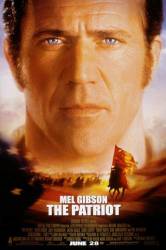Factual error: In the scene at Lord Cornwallis' outdoor party celebration, right after Benjamin Martin and his Continental Army blows up a British Ship, one of Lord Cornwallis' Captains throws back a big gulp of his drink from his Martini glass in grief and disbelief - the problem is this movie takes place in the mid 1700s and the Martini Glass wasn't invented until the 1920s, during the Roaring Jazz days.

The Patriot (2000)
Ending / spoiler
Directed by: Roland Emmerich
Starring: Mel Gibson, Chris Cooper, Jason Isaacs, Heath Ledger, Joely Richardson
Mel Gibson stabs Col. William Tavington with a blade that is connected to a gun. The english men retreat and the battle is won!
Cahzko
Colonel William Tavington: Kill me before the war is over, will you? It appears that you are not the better man.
Benjamin Martin: You're right. My sons were better men.
Trivia: The character Benjamin Martin was based very strongly on the real life militia leader Gen. Francis Marion, the "Swamp Fox". In the original drafts of the script even the character's name was to be Francis Marion. However, during filming certain historical sources revealed that Francis Marion was perhaps a very dubious character who was accused of hunting Native Americans for sport and raping his female slaves. Historical debate rages over the veracity of these accusations; but Sony Pictures changed the name of the character to Benjamin Martin to avoid any potential controversy around the film.
Question: Who was the baby in Charlotte's arms in the closing scene? Why was the baby not alluded to previously?
Answer: Additionally, in the film Charlotte says to Benjamin "I am not my sister," alluding that they were different people as Benjamin gets closer to her. As colonials were religious given the time, in the Bible in Leviticus 18:18 it says "do not take your wife's sister as a rival wife and have sexual relations with her while your wife is living." Since his wife was dead, this no longer applied and they believed in starting over, as the above post states.
Join the mailing list
Separate from membership, this is to get updates about mistakes in recent releases. Addresses are not passed on to any third party, and are used solely for direct communication from this site. You can unsubscribe at any time.
Check out the mistake & trivia books, on Kindle and in paperback.




Answer: At the end of the film, it is implied that Charlotte and Benjamin Martin have married and had a child together. It wasn't alluded to earlier because it is meant to show that a person's life can start over, even after tragedy and loss.
raywest ★